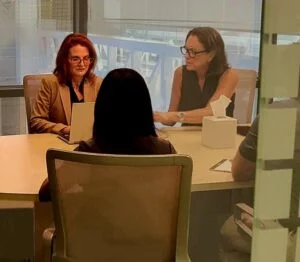A Florida Divorce Attorney’s Personal Perspective – Best Way to Divorce
A tale of necessity breeds innovation.
It was the Worst of Times…

I will never forget the day the covid state of emergency announcement was made on national news. Two days earlier, I had been to an event at the Winter Park Farmer’s Market with my friend Nina. We went to the annual Taste of Winter Park event, swilled drinks and gobbled appetizers with epicurean abandon, shoulder to shoulder with hundreds of other souls doing the same thing. For the next two weeks, Nina and I were sure we were goners.
Like so many at that time, I was near paralyzed by fears of the unknown: personal fear for the health and safety of my family and friends (and myself); and professional fear for my clients who were in the divorce process at the time (and for my business in general). I even feared for my Boston terrier, Boudreaux, because I did not know whether pets could also contract covid.
What would I tell my clients? That they had to remain unhappily married until there was a cure for covid? That their rights to time-sharing with their children had to wait? That a fair division of their assets and debts or support payments had to wait? Until when? And how could I get my clients divorced if I could not meet with them, or have negotiation meetings in their case, or set a court hearing?
Every courthouse in every county in Florida was locked down. Court administrators and judges in frenzied summits wrestled with the logistics of providing public access to the courts, an unalienable right, without being able to provide a public courthouse to fulfill that basic constitutional right.
The announcement of March 13, 2020 meant chaos and uncertainty for the entire world, far beyond the concerns I had for my near and dear. Professionally as a divorce attorney, I had no answers for my clients. This lack of clarity was excruciating for my clients and me.
When I Thought It Couldn’t Get Any Worse, It Did…

In a twist of ironic timing, three weeks after the Covid state-of-emergency announcement, I was savagely attacked by a 90- pound pit bull while taking a walk with my dog. He hit me from behind like a freight train after I turned my back and shielded Boudreaux with my arms. He mauled my right leg and fractured my L5.

I used a cane to walk for a year.
In the 20/20 of hindsight, Covid or no Covid, I would still have faced the puzzle of how to protect my clients using my computer and the internet instead of appearing at in-person negotiation conferences and court hearings. With my injuries, there were days I could not even drive my car or walk without yelling out in pain.
Finally, Florida court administrators announced all hearings and trials in family court would be held via remote video platforms. It did not take long for the rest of us in the legal community to transfer this idea into how we would meet with our clients, conduct negotiation conferences, the best way to divorce despite the situtation, and get our clients divorced over the next two years.
It also did not take long for us to learn getting a virtual hearing or trial meant shelving our clients’ unresolvable disputes for several months before we could get them court hearing time. The court dockets were backlogged long before Covid. After Covid, we could not present evidence real-time in court, so we had to exchange and submit our evidentiary materials well in advance of the hearing instead of at the hearing. This created double work for court preparation, which ultimately impacted our clients’ wallets
Necessity Breeds Innovation,
and Those Who Adapt Survive (and get Divorced)!
The net result of the difficulties getting a virtual court hearing during covid was this: it simply was not an option for most of my clients. They asked me, “What are my options? I can’t wait three or four months for my dispute to be resolved, and I would rather spend my money on (fill-in-the-blank) than a two-hour court hearing.”
Thus, the virtual divorce was born.
In fortunate precipitation of Covid, the state of Florida had already established the statewide electronic filing portal system in 2013.
Before 2013, if you needed to file a lawsuit, motion the court for a hearing, or get a summons issued, you had to physically go to the clerk of court’s office in your local county courthouse and file a paper copy with the assistance of a deputy clerk.
With divorce legal services 100 percent virtual for more than two years, the family law community realized we could avoid the waiting game and our clients’ indefinite uncertainty and misery if they agreed to use an uncontested divorce process. That is, a divorce by negotiation, collaboration, cooperation, or mediation.
Even in the most acrimonious of cases, these uncontested ways to divorce became a far better option for my clients than waiting endlessly for resolution by a judge at contested court hearings and trials. Uncontested conferences in virtual platforms resulted in not just a faster divorce but, more often than not, a lightning-fast divorce.

It was the Best of Times…
A Hidden Blessing of Virtual Divorce Rises to the Surface…
Divorce attorneys in the legal community were surprised to learn there was yet another unexpected benefit for clients divorcing in the virtual world – physical, live confrontations between spouses in hostile divorce cases were taken out of the equation. Those thorny and often down-right painful live encounters between spouses were replaced with remote viewing of one another in the safe cyber-sphere of a video screen.
We learned there were no drawbacks, only advantages,
to working virtually in uncontested cases.
Visual sensory cues important in the negotiation process were not lost, but the intimidation factor from the physical presence of other attorneys and an angry or aggressive spouse was gone. Most importantly of all as it turned out, we learned the decrease in our clients’ anxiety and feelings of intimidation during their divorce resulted in their ability to make better decisions on critical and life-changing issues in their case.
June Sory, an Ivy League psychotherapist and counselor noted for her work in marriage and family therapy, spoke with me about this unexpected psychological bonus of virtual divorce I was not expecting to discover.
“The opposite of love is not hate,” Ms. Sory told me. “The opposite of love is indifference.”
Ms. Sory has worked with couples in therapy for over two decades. She told me she recognized long ago the negativity that spews from angry partners is a mix of: (1) a demand to be heard and felt; and (2) a desire to have their respective emotional needs met.
She had the following interesting insights:
“The spouses are screaming:
“ – See me!
– Love me!
– Respect me!
– Hear me!”
For myriad reasons too expansive to discuss here, the couple cannot communicate, and what was once a positive emotion is now profoundly negative. The dark side of love (hate) prevails, and neither feels heard or understood. Consequently, a messy, contentious divorce floats to the top.”
“If you have heard of the 7/38/55 rule, you will remember that seven percent of communication is verbal (spoken words), 38 percent is vocal (how words are spoken), and 55 percent is body language. Thus, 93 percent of communication is non-verbal!
In the cases of angry, hostile, resentful partners, the presence of the other in the parking lot, or (worse) in the elevator or waiting room, nonverbal communication in in-person contexts can trigger fear, resentment, hostility, and the desire to hurt the other like they have been hurt. None of these emotions are conducive to a successful negotiation.”
“Enter virtual divorce. In the confines of their own safe spaces, the partners can meet with their attorney(s) without feeling the other’s negative energy or witnessing their angry body language.”
“Additionally, should the proceedings become heated, the attorney can calmly end the virtual meeting without the partners having to leave the conference room heated and upset.”
“The advent of virtual meetings has triggered discussions of its risks and benefits. Some believe the “human element” and the “human connection” are absent during virtual interactions. Removing the “human element” and the negative “connection” of divorcing couples facilitates divorce proceedings saving stress, time, and money.”
Here are some references on virtual divorce as it developed during the pandemic:
Virtual Divorce Survives Post-Pandemic:
When the pandemic lockdown and ban on in-person contact was lifted in 2022, almost every family law judge in every county in Florida returned to requiring personal appearances in trials and hearings requiring evidence. However, the pandemic-inspired policy survived the return to in-person court hearings when your divorce case reaches a full settlement in an uncontested divorce process. In that event, you and your spouse do not have to appear at court at all, not even for the final hearing.
During Covid, because of social distancing requirements, court administrators put into place online final hearing procedures, which saved divorcing spouses from personally attending the dreaded final divorce hearing in court.
These online final hearing procedures have remained post-Covid, largely because they lighten a judge’s court docket. They also remain because judges give great deference to a divorcing couple’s ability to behave civilly and reach their own conclusions about the terms of their divorce (which spares judges’ limited time and brainpower to do that for you).
It Was the Best of Times…
Your reward from family law judges for settling your case using uncontested divorce methods is not having to appear in court. This includes final divorce hearings.
While virtual divorce arose as a necessity during the social distancing requirements of during Covid, virtual divorce is and will remain a premier choice for couples who want a seamless and straightforward divorce process without once stepping into a courtroom or a lawyer’s office — you don’t even have to step into your car.
Thanks to covid (let’s take the silver linings where we can get them), you can now get divorced without appearing in court even one time.
Over my two-year journey of divorcing clients during Covid, I discovered many other benefits to my clients. For instance, it is ideal for couples who have already separated and live in different cities, states, or countries. It is also perfect for the calendar-challenged — it takes no time away from life activities such as work, childcare, or travel.
Best of all, I am told by my clients that virtual divorce saves money. Because scheduling virtual meeting times is faster and easier, your case moves more quickly, thus lessening attorney time. Legal fees for a virtual divorce are a fraction of the cost of a contested (otherwise known as litigated) divorce.
For detailed information on the virtual divorce online process in Florida, here are some references:
Virtual Divorces are Not One Size Fits All!
You Have Choices…

Let’s talk about the different options you have for divorcing. Divorces fall into two major categories: contested divorce and uncontested divorce.
If you are entirely at odds with your spouse on important matters such as the custody of your children, who should remain in the marital home, or how marital assets and debts should be divided, then your case falls in the category of contested, also known as litigated, divorce.
A contested divorce can be handled virtually. An experienced divorce lawyer skilled in negotiation can keep a contested case out of litigation.
It is important to know in Florida, you cannot take a disputed issue to court for resolution until you and your spouse first attempt to resolve your dispute in a mediation conference. The majority of divorce cases in Florida are concluded at mediation.
A seasoned family law attorney who is handling your case virtually can resolve disputes in mediation conducted by video just as effectively as in a live meditation conference. Suppose your virtual divorce turns into a litigated divorce after a failed attempt at mediation or other uncontested process. In that case, your virtual divorce attorney can either agree to represent you at future contested court hearings or refer your case to a litigation attorney with whom they closely associate.
Uncontested Divorces can Always be Virtual Divorces:

The most common type of divorce case conducted virtually is an uncontested divorce. There are generally four types of uncontested divorce: (1) negotiated divorce; (2) collaborative divorce; (3) cooperative divorce; and (4) mediated divorce. All four methods are ideally suited for remote, virtual resolution.
A negotiated divorce occurs when your divorce attorney and your spouse’s divorce attorney meet and confer on the points of contention in your case. With the advocacy of each of your attorneys and the final approval of you and your spouse, each party to the divorce makes concessions on terms where appropriate, which results in a settlement and swift conclusion of your case.
This is one of the least expensive divorce options because there are no third-party mediators or other professionals utilized in the process. A negotiated divorce is ideal when you and your spouse are, for the most part, on the same page about the terms of your divorce and just need assistance getting the details set down in writing.
In a collaborative divorce, you and your spouse have a divorce team. The team is comprised of you, your spouse, and four divorce professionals hired with the goal of a full settlement. Collaborative divorces are completely confidential and require no court appearances. You and your spouse each have collaboratively trained divorce attorneys to represent you, and neutral financial and mental health professionals are also brought on board. Collaborative divorce is designed to support the divorcing couple in all areas: legal, financial, and psychological/ emotional.
If you and your spouse have sensitive issues involved in parting ways, such as:
- differing views on how to raise your children;
- extra-marital affairs, substance abuse, or mental health challenges;
- complex or high-net-worth marital assets and/ or debts; or
- polarized views on their division,
Collaborative divorce can be a highly effective, modern alternative that can keep your differences out of court and in the hands of specifically trained professionals. It is also ideally suited to be conducted virtually in through video conferences until a full agreement is reached.
Here is more information on collaborative divorce:
- Three Things You Should Absolutely Know About This Type of Divorce! – Watch Video
- Is Collaborative Divorce Right For Me?| Divorce Attorney Answers – Read Full Article

Cooperative divorce is similar to a collaborative divorce, except only one neutral professional is hired to assist in the divorce process instead of two or more. Both you and your spouse are represented by collaboratively trained divorce attorneys, and typically only a mental health professional or only a financial professional is hired to complete the team.
A cooperative divorce can also be conducted by an attorney-mediator upon whom you and your spouse both agree, who works alongside the neutral professional to get your case fully resolved.
Cooperative divorce is a powerful method when your major points of dispute are fall in one area. It is also less costly than a collaborative divorce and can be less costly than a mediated divorce, especially if you and your spouse agree on an attorney-mediator to work with the professional neutral.
Here’s an example of cases well-suited to cooperative divorce: If you either do not have children, or you have children and you and your spouse completely agree on how they should be raised post-divorce, then you probably do not need a neutral mental health professional for assistance with negotiating a parenting plan.
But let’s say you have complex or high-net-worth marital assets, multiple income streams, and/or debts to be divided. In such a case, a neutral financial professional is hired to assist in resolving a fair distribution of marital assets and liabilities.
On the other hand, if your marital assets and debts are straightforward or few, but you are in complete opposition about how your children should be raised, then a neutral mental health professional is brought in to assist you and your spouse in developing a parenting plan which best supports your family.
A mental health neutral is also invaluable where highly charged emotions are involved in your divorce, such as cheating, substance abuse, or personality disorders present in one or both spouses. Cooperative divorce is also ideally suited to be conducted virtually.
Here is more information on cooperative divorce:
- Is this type of DIVORCE Right For YOU? – Watch Video
- Cooperative Divorce Attorney Orlando – Thanks To Groundbreaking Advances In Florida Divorce, The Words “Cooperative” And “Divorce” Are No Longer Mutually Exclusive… – Read Full Article

Now let’s talk about mediated divorce. There are two types of mediated divorce:
(1) represented mediation, and (2) unrepresented mediation, also known as a pro se (without counsel) mediation. Both methods are highly effective when conducted virtually.
In a represented mediation, you and your spouse are individually represented by divorce attorneys (who ideally are both collaboratively trained), and a third-party family law mediator is hired to negotiate the sticking points in your divorce.
This type of mediation is best when you and your spouse are at loggerheads over the details of your divorce, but given insight, education, and information on how divorce laws apply to these details, you and your spouse are enlightened about the other side of the coin. Thus, informed concessions can be made by you and your spouse regarding your opposing positions, paving the way to a full settlement of your case.
In an unrepresented mediation, neither you nor your spouse is represented by legal counsel. You both agree to hire a family law mediator who assists in and guides the negotiations with the goal of a full settlement. An unrepresented mediation is also one of the least expensive divorce options. It is important to keep in mind your mediator is neutral, therefore, cannot give either of you legal advice about your rights in a divorce.
The family mediator can inform you of considerations a judge may have on a particular issue by applying Florida divorce laws. This method of mediation is ideal for a divorcing couple who, for example:
- have been married less than six years;
- have no children;
- have few marital assets and debts;
- or essentially agree on the major components of their divorce and just need help hammering out the details.
Here is more information on mediated divorce:

Why Should I Divorce Virtually?
The reasons to divorce virtually are virtually countless…
Even before the pandemic, the landscape of divorce has slowly been evolving into more civilly handled, more healthful, less costly methods. The virtual divorce is a perfect example. Post-pandemic, the overwhelming benefits of pandemic-style divorces have shown us there is a continuing need for virtual divorce for more reasons than not.
Here’s a few my clients have expressed to me:
- The lessening of intimidation and anxiety due to the absence of in-person confrontations;
- Spouses who frequently travel for business or other reasons;
- Spouses who have limited time due to their work or childcare schedules;
- Spouses who have already separated and are living in other cities, states, or countries;
- Spouses who desire a straightforward and quick process with no court appearances;
- Spouses who don’t want a quick divorce because they wish to dictate the pace instead of being bound by legal time requirements triggered in contested divorce;
- Spouses who wish to keep the personal dynamics of their family confidential and out of the public record;Spouses who wish to keep their assets within the family instead of paying hourly billing fees to attorneys in endless litigation.
Virtual law offices allow you to benefit from the efficiency and effectiveness of quality legal services from the comfort of your home or other remote location of your choosing.
By contrast, in-person, contested divorce proceedings consume valuable and irreplaceable hours, days, weeks, and months (sometimes years) from sacred aspects of your life — your peace and well-being, your children, your wellness plan, your pleasure activities, your work.
With a virtual divorce, you can be at ease knowing you are in your own safe space while during one of the most mentally and physically taxing transactions you will ever have in your lifetime.
During the pandemic and handling of divorce cases for my clients remotely for over two years, we at Morgan Divorce Law have taken that time to establish and perfect the virtual divorce.
If you believe you qualify for a virtual divorce or have questions about the types of divorce available to you, please reach out to our team here at Morgan Divorce Law, and let’s set up a time to talk. We have headquarters in Orlando and Palm Beach and represent residents in greater central and south Florida.
But, for a virtual divorce, we can represent you in any county in Florida. Fill the contact form to the right on this website www.MorganDivorceLaw.com.
 Reviews
Reviews 
